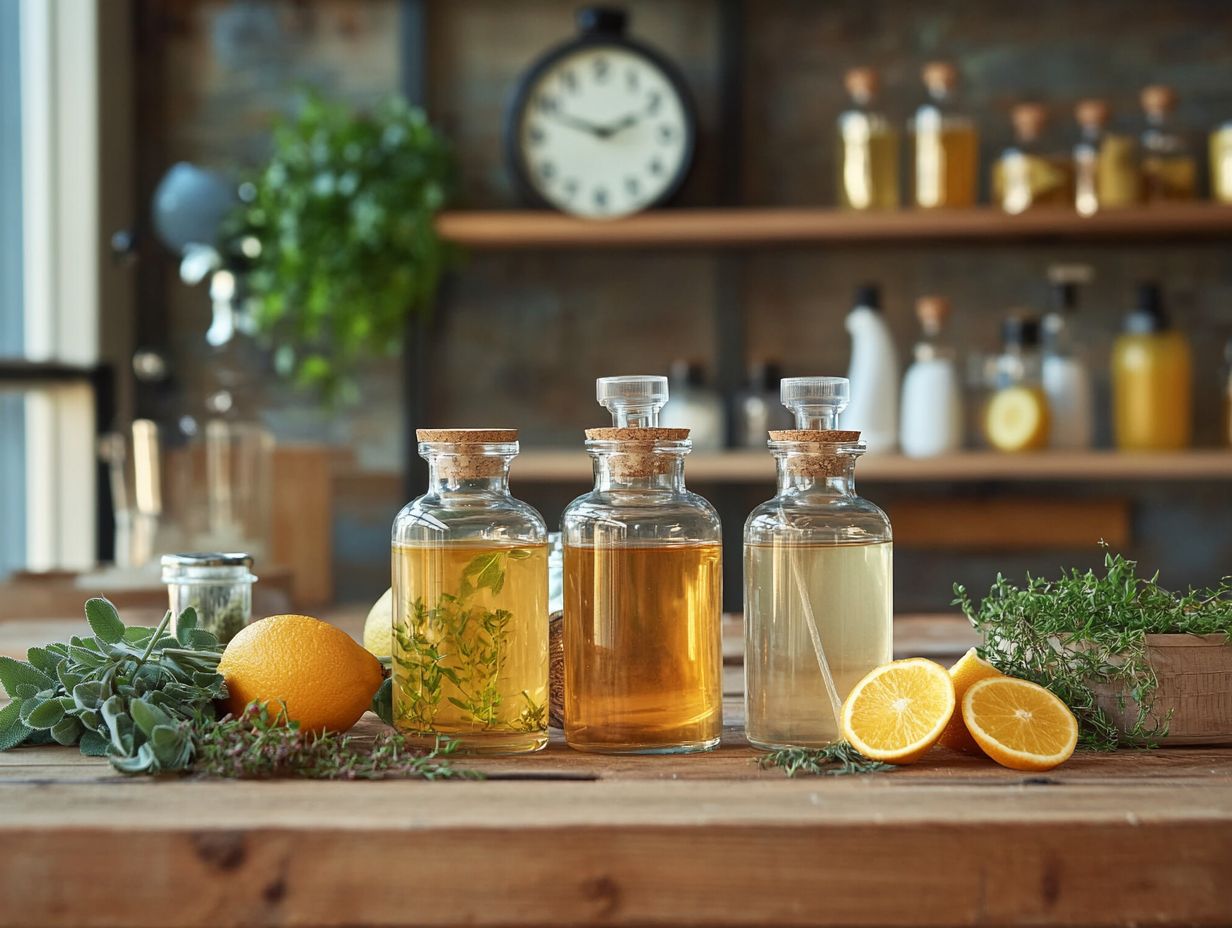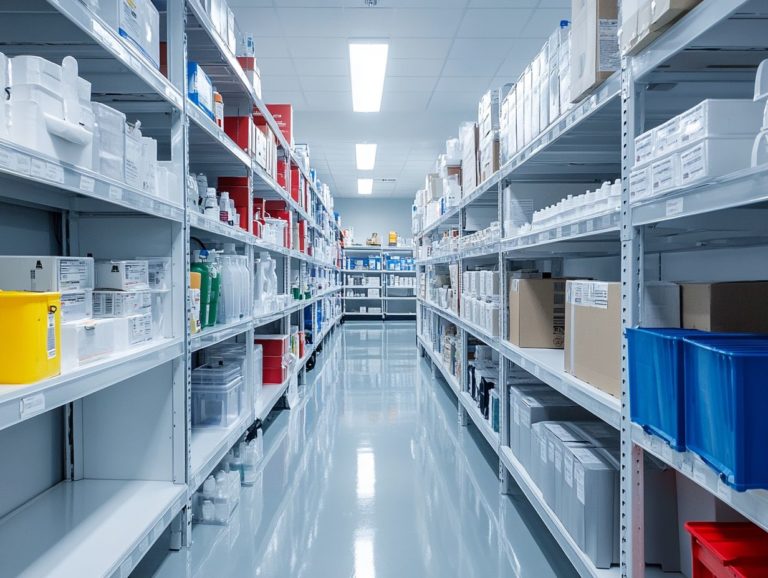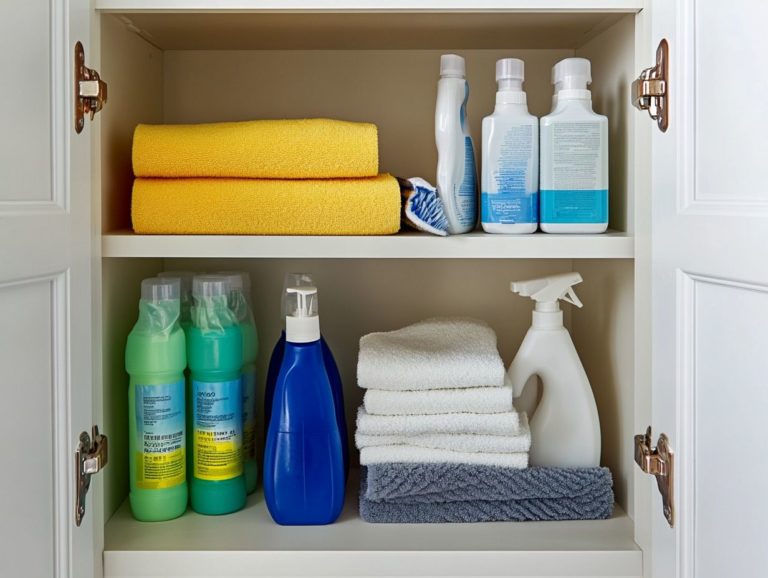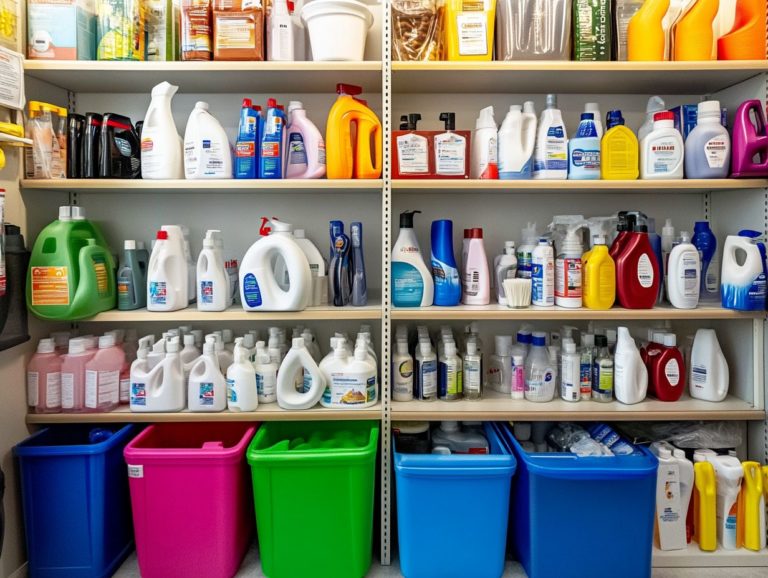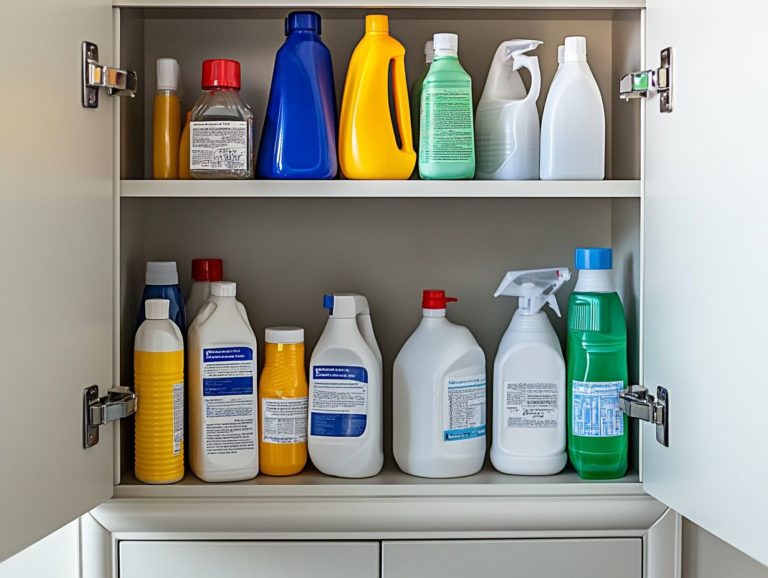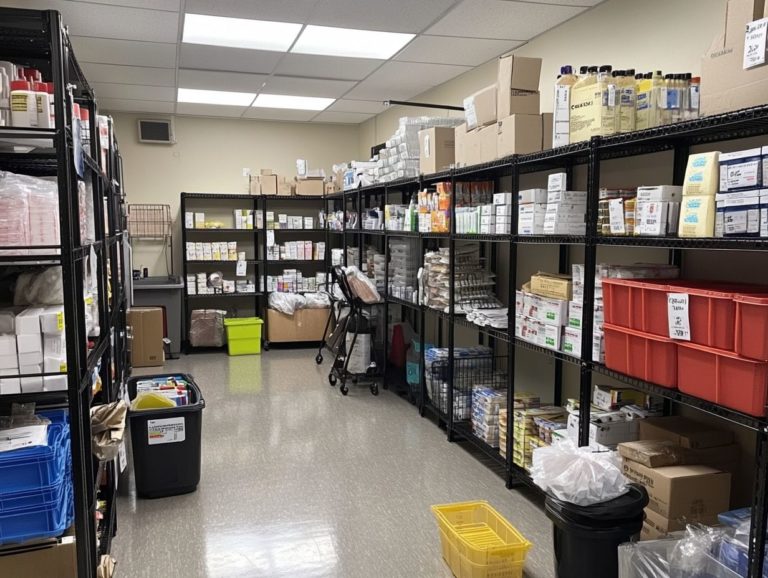How Long Can You Store Homemade Cleaners?
In a world increasingly focused on sustainability and health awareness, many individuals are discovering the advantages of homemade cleaners as a superior alternative to commercial cleaning products. But what exactly are these homemade solutions, and why should you contemplate crafting your own cleaning recipes?
This article delves into the benefits and potential risks of DIY cleaners. It highlights common natural ingredients you can use and offers essential cleaning tips for proper storage and shelf life.
Whether your goal is to save money or minimize chemical exposure, understanding homemade cleaning methods can empower you to create a cleaner and more eco-friendly home.
Contents
- Key Takeaways:
- What Are Homemade Cleaners?
- Why Make Your Own Cleaners?
- What Are the Ingredients Used in Homemade Cleaners?
- How to Store Homemade Cleaners?
- What Is the Shelf Life of Homemade Cleaners?
- How to Extend the Shelf Life of Homemade Cleaners?
- Frequently Asked Questions
- How Long Can You Store Homemade Cleaners?
- What Is the Average Shelf Life for Homemade Cleaners?
- How Can I Extend the Shelf Life of My Homemade Cleaners?
- Can I Use Homemade Cleaners, Including Non-Toxic Cleaners, Past Their Expiration Date?
- Are There Any Specific Ingredients That Can Help Extend the Shelf Life of Homemade Cleaners?
- What Are Some Signs That My Homemade Cleaner Has Gone Bad?
Key Takeaways:
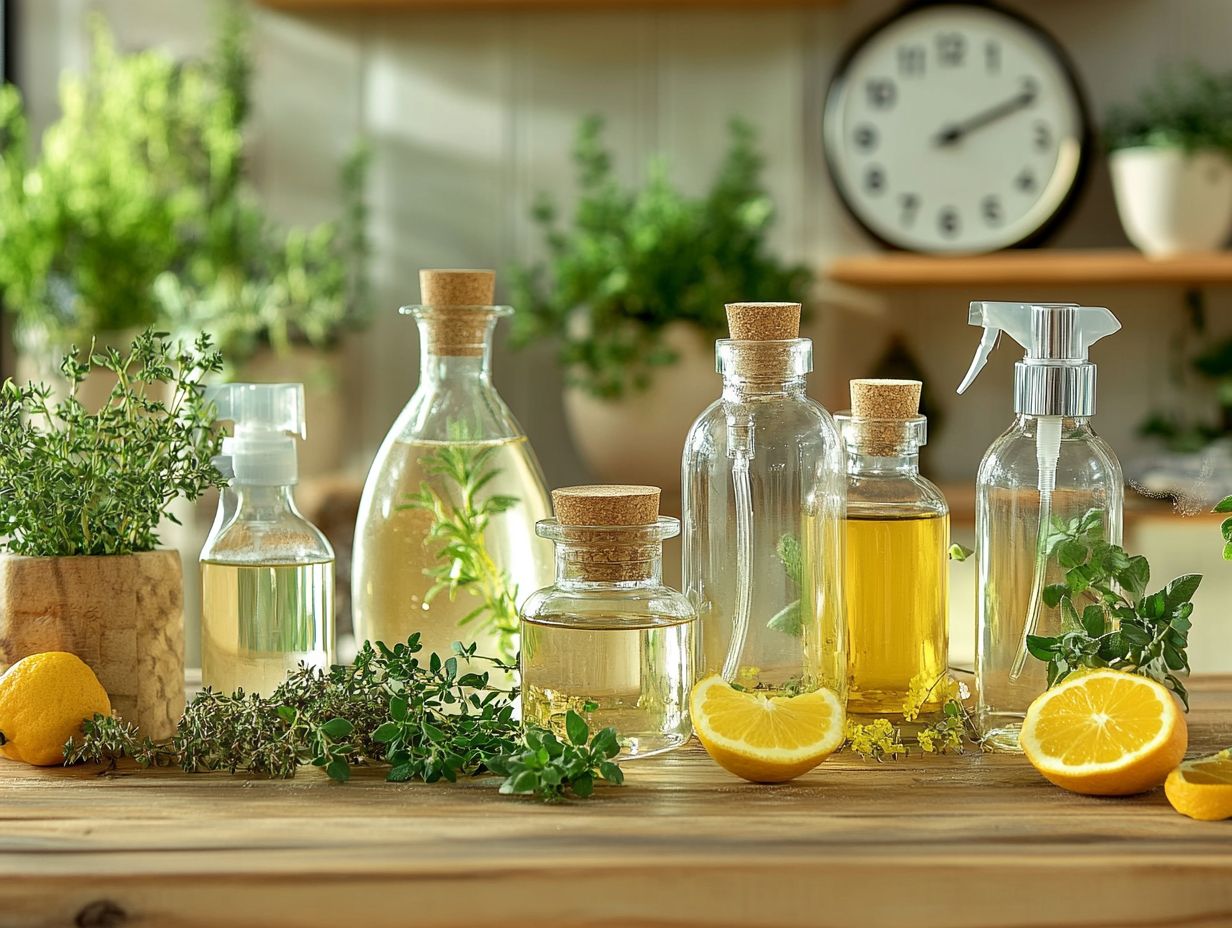
- Homemade cleaners have a shelf life of 1-3 months. Shelf life refers to how long a product remains effective, depending on the natural ingredients used and how they are stored.
- To extend the shelf life of homemade cleaners, store them in airtight containers in a cool, dry place away from sunlight and moisture, following proper cleaning tips.
- Natural ingredients such as vinegar, lemon, and baking soda typically have a shorter shelf life compared to essential oils. Essential oils can help prolong the shelf life of homemade cleaning solutions.
What Are Homemade Cleaners?
Homemade cleaners present a good-for-the-environment approach to maintaining cleanliness. They are crafted from natural ingredients that effectively clean and disinfect surfaces while avoiding harmful chemicals found in conventional cleaning products.
You can effortlessly create these DIY cleaners at home using simple ingredients like vinegar, baking soda, and essential oils. This makes them an attractive option for those in search of non-toxic cleaning alternatives.
Not only do these homemade cleaners help you save money, but they also minimize your exposure to the health risks associated with chemical cleaners and other household cleaners. Ultimately, they foster a healthier living environment.
Why Make Your Own Cleaners?
Creating your own non-toxic cleaners offers a wealth of advantages. These range from significant cost savings to the ability to customize formulations to suit your specific needs.
Most importantly, you gain peace of mind knowing that you re using non-toxic ingredients, which is essential for fostering a safe and healthy home environment.
Unlike commercial chemical cleaners that can carry health risks, your homemade solutions often consist of straightforward ingredients like vinegar and baking soda. These ingredients prove to be effective for a myriad of cleaning tasks.
Crafting your own non-toxic cleaners allows you to tailor them to tackle specific cleaning challenges. This ensures you achieve the highest level of effectiveness in your efforts.
What Are the Benefits of Homemade Cleaners?
Homemade cleaners offer you a wealth of benefits, including their impressive ability to eliminate odors and bacteria without the harsh effects of chemical agents. This makes them an excellent choice for those who are eco-conscious and prefer natural cleaning methods.
Typically crafted from ingredients like vinegar and baking soda, these cleaners are not only budget-friendly but also incredibly versatile. They serve various cleaning needs from surface cleaners to mildew removers.
Their non-toxic nature fosters a healthier living environment, minimizing your exposure to harmful chemicals and allergens. They also make excellent multi-purpose cleaners.
Their effectiveness is well established; for instance, a simple mixture of distilled white vinegar and water can effortlessly cut through grime, leaving your surfaces sparkling. If you re dealing with stubborn stains, a paste made from baking soda and water works wonders as a stain remover, providing gentle abrasion without risking damage to the surface.
You can even add essential oils to enhance the pleasant aroma. This offers a natural odor control that synthetic air fresheners simply can t match.
This means you can easily personalize your cleaning routine to fit your style! Join the movement! Discover how easy it is to make your own cleaners today and enjoy a healthier home while saving money.
What Are the Risks of Homemade Cleaners?
While homemade cleaners often offer a safe alternative, it’s important to recognize that certain risks come with their use, especially when ingredients are combined improperly or misapplied. Missteps can lead to health hazards, surface damage, or other cleaning issues.
For example, vinegar can damage specific surfaces if not diluted correctly. Some DIY cleaning recipes may not effectively eliminate bacteria if not prepared precisely. Being mindful of these risks will help you maximize the effectiveness of your homemade solutions while minimizing potential downsides.
Using too much essential oil can lead to bad smells and even skin irritations. If you have respiratory issues, strong scents might worsen your condition, turning a simple cleaning task into a health concern.
Fortunately, by following established recipes and selecting surface-safe ingredients, you can craft effective cleaners that align with health guidelines and protect your surfaces. Knowing what each ingredient does helps you avoid cleaning mishaps and foster a safer environment for everyone in your household.
What Are the Ingredients Used in Homemade Cleaners?
The ingredients you choose for homemade cleaners are primarily natural substances that prove both effective and safe for a multitude of cleaning tasks. Staples like vinegar, baking soda, essential oils, and lemons are key components.
Each of these ingredients is celebrated for its exceptional cleaning properties. For instance, distilled white vinegar is a powerful disinfectant, while baking soda serves as a natural scrubbing agent and deodorizer.
By incorporating these elements into your cleaning routine, you not only embrace an eco-friendly approach but also enhance your cleaning effectiveness with natural techniques, all without worrying about harmful side effects.
What Are the Common Ingredients in Homemade Cleaners?
Common ingredients in your homemade cleaners include versatile substances like vinegar, baking soda, and essential oils. Each serves multiple cleaning purposes and enhances the effectiveness of your DIY solutions.
Take distilled white vinegar, for instance; it acts as a natural disinfectant and deodorizer. Meanwhile, baking soda brings a gentle scrubbing quality, perfect for cleaning surfaces. Essential oils, such as lemon oil, not only infuse your cleaning routine with delightful fragrances but also add antibacterial properties, making them a superb addition to any cleaning recipe.
You can combine these ingredients in countless ways to tackle various cleaning tasks around your home. For example, mixing vinegar and baking soda creates a dynamic foaming action that can help unclog drains or refresh your laundry. When using essential oils, just a few drops can boost their cleaning power. Tea tree oil is especially effective due to its antifungal properties, making it ideal for mold-prone areas like bathrooms.
To fully harness these benefits, consider the surfaces you’re cleaning to ensure your combinations are both safe and effective. Testing new mixtures in small areas allows you to observe their effects before applying them more broadly, ensuring your cleaning efforts are efficient and tailored to your home.
Try these recipes today for a cleaner, safer home!
What Are the Natural Ingredients Used in Homemade Cleaners?
Natural ingredients like vinegar, baking soda, and essential oils are your allies in creating powerful homemade cleaners that embrace eco-friendly practices and natural cleaning methods.
These ingredients excel at cutting through grime and disinfecting surfaces while sparing you from the harmful chemicals often found in commercial products. Using these safe alternatives cultivates a healthier indoor environment for you and your family, promoting home cleaning with natural agents.
For example, vinegar is excellent at eliminating bacteria and mold, making it a top choice for kitchens and bathrooms. A sprinkle of baking soda on carpets works wonders to absorb odors, leaving your spaces smelling delightfully fresh. These cleaning hacks can significantly enhance your routine cleaning efforts.
To elevate your cleaning game, incorporate essential oils like tea tree or lavender. Not only do they bring their natural antibacterial properties to the mix, but they also make cleaning a soothing and enjoyable experience, suitable for various cleaning supplies.
How to Store Homemade Cleaners?
Storing your homemade cleaners correctly is crucial. It keeps them effective and safe for your family, especially when using reactive ingredients like vinegar or essential oils. This ensures you preserve the benefits of vinegar and overall cleaning effectiveness.
Opt for appropriate containers, ideally labeled glass or plastic bottles, to maintain the quality of your cleaners and prevent unwanted chemical reactions that might arise from unsuitable materials. This keeps your vinegar cleaning solution safe!
Mind the right storage environment keeping them in cool, dark places can significantly extend the lifespan of your eco-friendly cleaning solutions.
What Are the Best Containers for Storing Homemade Cleaners?
The optimal containers for storing your homemade cleaners are typically glass bottles or high-quality plastic containers that are both durable and resistant to chemical reactions, ensuring the integrity of your cleaning solutions. Glass containers are preferred for their non-reactive properties, perfect for vinegar-based cleaners and other potent mixtures.
Choose containers with secure lids to prevent spills and contamination. Consider UV protection for any light-sensitive ingredients. Using distilled white vinegar in your cleaning recipes enhances cleaning effectiveness while protecting the surface cleaner from degradation.
While glass offers numerous benefits, it can be heavy and easily breakable, necessitating careful handling. High-quality plastic containers are lightweight and less prone to breakage, making them practical, especially in households with children or pets. Glass is often preferred for non-toxic cleaners, but plastic offers more convenience for routine cleaning tasks.
When selecting an eco-friendly storage solution for your homemade cleaning supplies, ensure that the plastic is free from harmful chemicals like BPA. Opting for reusable containers minimizes waste and supports a greener lifestyle. For homemade cleaner preparations, consider integrating natural cleaning agents like vinegar and essential oils to enhance environmental benefits.
Ultimately, your choice between glass and plastic will depend on the specific ingredients in your cleaning solution, their intended use, and your personal preferences. Whether you are making a surface cleaner or a cleaning spray for odor removal, the right container will impact the longevity and effectiveness of your solution.
Why wait? Start your eco-friendly cleaning journey today by choosing the best containers for your homemade cleaners!
What Are the Best Places to Store Homemade Cleaners?
The optimal places to store your homemade cleaners are cool, dark areas that reduce exposure to light and heat, which can diminish the effectiveness of your carefully selected ingredients over time. Consider utilizing kitchen cabinets or closets that are shielded from direct sunlight and heat sources. This ensures your cleaning supplies remain potent and ready for action.
Keep these cleaners out of reach of children and pets. This enhances safety and provides a dedicated space for better organization.
The choice of storage containers can significantly influence how long your homemade solutions last. Opt for dark glass or opaque containers to protect the contents from harmful UV rays. Ensure the containers are airtight to keep moisture out.
It s wise to label each cleaner with the date it was made! This makes it easy to track freshness and ensures you re using effective solutions. Regularly inspect the condition of these solutions and responsibly dispose of expired items this is a smart practice.
Creating a designated cleaning supplies caddy can further optimize your organization process, making it a breeze to locate what you need while keeping everything neatly contained and secure.
What Is the Shelf Life of Homemade Cleaners?
The shelf life of your homemade cleaners can vary widely based on the ingredients you choose, how you store them, and whether or not you include preservatives. When stored properly, many of these concoctions can last anywhere from a few weeks to several months.
For example, vinegar-based cleaners typically have a longer shelf life compared to those made with fresh ingredients like citrus juices or herbs, which tend to spoil more quickly. Grasping these factors is crucial for ensuring that your homemade cleaning solutions maintain their effectiveness over time. Additionally, knowing how to store homemade cleaners safely can further extend their usability.
What Factors Can Affect the Shelf Life of Homemade Cleaners?
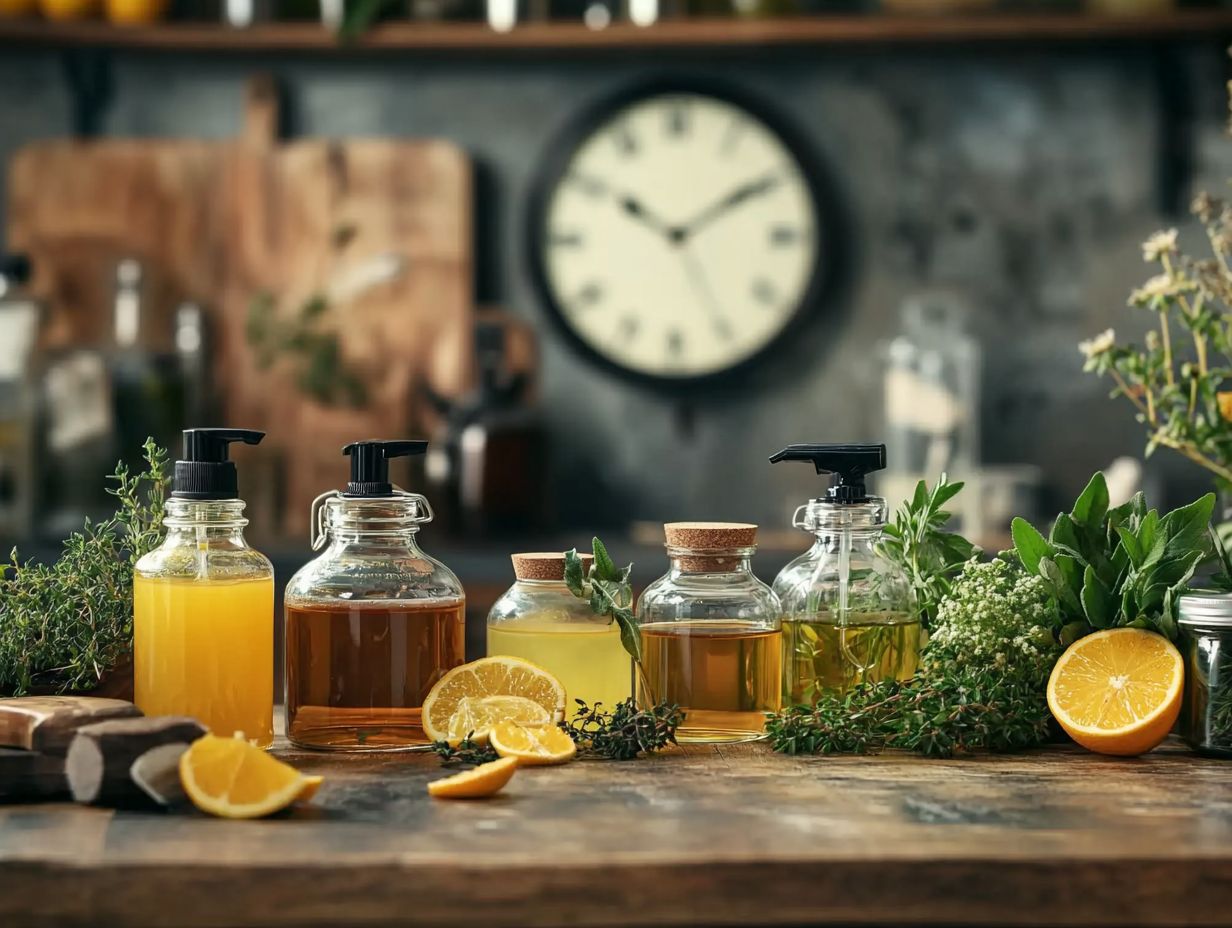
Several factors can significantly impact the shelf life of your homemade cleaners, including the types of ingredients you use, the storage conditions, and their exposure to air and light, all of which can compromise their effectiveness. For instance, cleaners made with fresh ingredients like lemon juice typically have shorter shelf lives compared to those that primarily contain vinegar or baking soda. If you store them improperly in damp or warm environments, you risk speeding up their breakdown, meaning their cleaning power will weaken over time.
To enhance the longevity of these mixtures, it s essential to consider what goes into them. Using preservatives, even natural ones like essential oils, can help inhibit the growth of bacteria and mold. For example, incorporating vitamin E oil or citric acid can provide additional preservation methods for your DIY cleaners.
Your choice of storage matters. Use dark, airtight containers to guard your cleaners against light and air. Regularly check the appearance and smell of your cleaners! This quick action lets you discard any that show signs of spoilage before they cause a cleaning headache.
What Are the Signs That Homemade Cleaners Have Expired?
Look for signs that your homemade cleaners have expired. Changes in appearance, scent, or consistency often indicate a loss of effectiveness or safety.
For instance, if your vinegar-based cleaner starts to look cloudy or gives off an unpleasant odor, it s a clear signal that it may no longer be suitable for use. Signs of surface damage or reduced cleaning effectiveness also indicate it’s time to make a new batch.
Changes in texture or the appearance of sediment indicate that the cleaning solution has degraded. Discard it to ensure effective cleaning and avoid safety risks.
Other red flags include separation of components or unexpected layers, which indicate that the ingredients may have broken down. Check the expiration dates of your ingredients. This step helps keep your cleaner effective!
When it’s time to dispose of expired cleaners, do it safely! Pour them down the drain with plenty of water or throw them away, following local disposal guidelines.
How to Extend the Shelf Life of Homemade Cleaners?
To extend the shelf life of your homemade cleaners, it’s crucial to employ effective storage techniques, choose stable ingredients, and utilize preservation methods that keep them working at their best. For example, using ingredients like vinegar and baking soda in your cleaning recipes can enhance their longevity.
By storing your cleaners in airtight containers and placing them in cool, dark locations, you can dramatically slow down the breakdown.
What Are the Tips for Properly Storing Homemade Cleaners?
Properly storing your homemade cleaners is all about using the right containers, maintaining optimal conditions, and labeling them clearly for easy identification. This approach ensures you preserve their effectiveness.
For instance, dark glass containers can shield sensitive ingredients from light, while tightly sealing them prevents contamination and evaporation. By keeping your cleaners in a consistent environment away from heat sources and moisture you ll significantly enhance their longevity and usability.
Choosing the right materials for storage is crucial; opt for glass or a strong type of plastic as these are preferred for their durability and inert nature. It’s essential to stash these cleaning solutions in a cool, dark place, as extreme temperatures and direct sunlight can degrade their effectiveness over time.
To promote organization and safety, clear labeling is key. Detail the contents, dilution ratios, and expiration dates to prevent any accidental misuse and ensure you can easily access what you need. By implementing these best practices, you not only maintain the potency of your homemade cleaners but also contribute to a safer household environment.
What Are the Alternatives to Prolonging the Shelf Life of Homemade Cleaners?
You have several alternatives to extend the shelf life of your homemade cleaners. Consider incorporating specific preservatives, choosing alternative natural ingredients, and adding shelf-stable ingredients that enhance durability while ensuring eco-friendliness. For instance, adding a touch of vitamin E oil or citric acid can help inhibit microbial growth in liquid cleaners. This way, you can prolong their usability. Selecting ingredients known for their longevity, such as vinegar and baking soda, contributes to more stable and effective cleaning solutions.
Exploring essential oils boosts the antibacterial properties of your cleaners and makes cleaning much more enjoyable with delightful scents. It s essential to find the perfect balance to ensure your cleaners work effectively!
Paying attention to proper storage conditions is equally important. Using dark glass containers protects your solutions from light, helping maintain their potency over time. By thoughtfully blending these preservation techniques, you can create a range of eco-friendly cleaning products that truly stand the test of time.
Frequently Asked Questions
How Long Can You Store Homemade Cleaners?
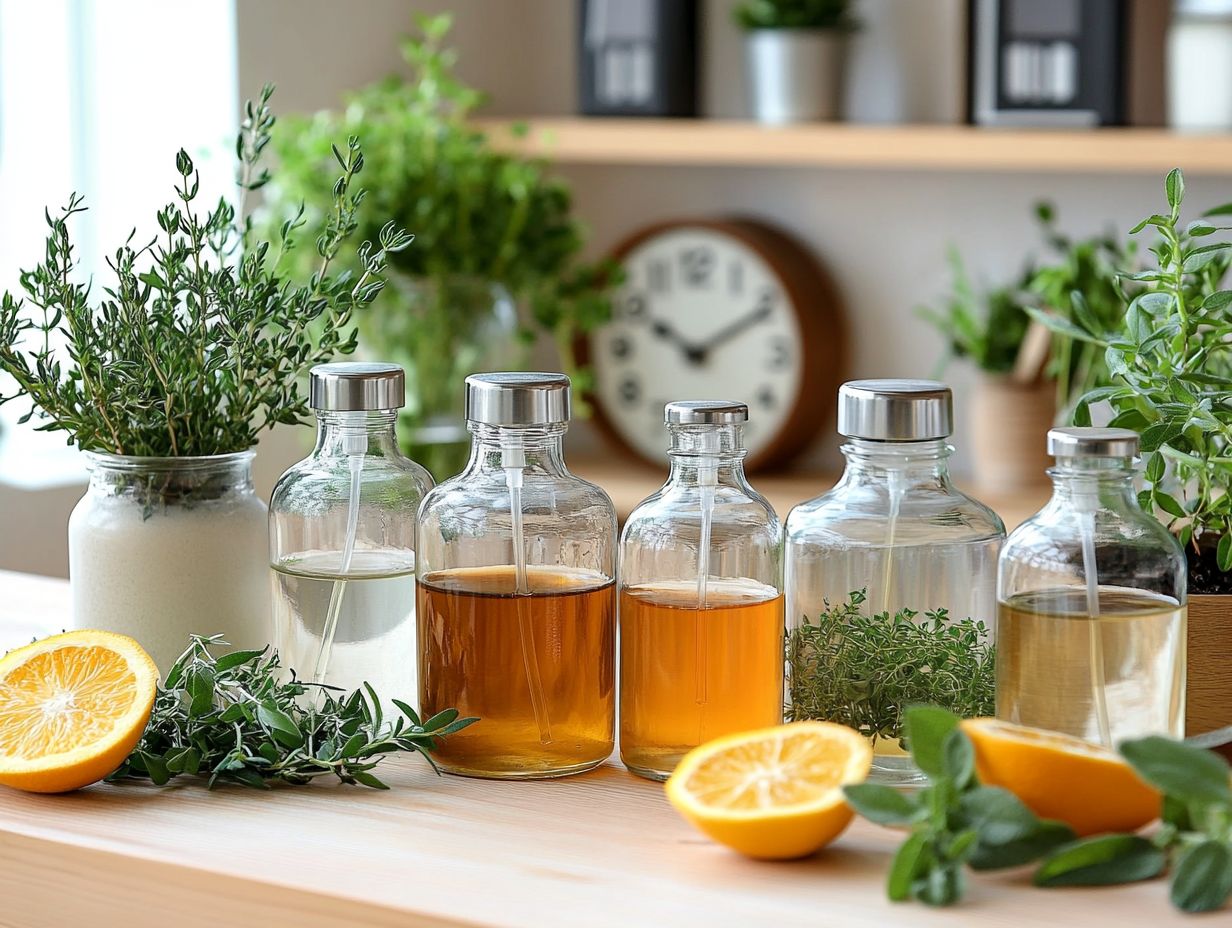
Storage time varies based on ingredients and methods. Properly label and store your cleaners to ensure their effectiveness and safety. For instance, using dark glass containers and keeping them in cool, dark areas can significantly extend the shelf life of products like lemon vinegar or vinegar cleaning solutions.
What Is the Average Shelf Life for Homemade Cleaners?
The average shelf life for homemade cleaners is typically around 6 months to 1 year. However, this can vary depending on ingredients and storage methods. For example, vinegar-based cleaners, like a cleaning spray made with vinegar, can last longer than those made with fresh citrus juices or herbs.
How Can I Extend the Shelf Life of My Homemade Cleaners?
To extend the shelf life of homemade cleaners, store them in a cool, dry place away from direct sunlight. Using airtight containers also helps prevent ingredients from degrading too quickly. Incorporating natural cleaning agents, such as baking soda and distilled white vinegar, can contribute to the longevity of your products.
Can I Use Homemade Cleaners, Including Non-Toxic Cleaners, Past Their Expiration Date?
We do not recommend using homemade cleaners past their expiration date, as their effectiveness and safety cannot be guaranteed. The potential health risks highlight the importance of making a new batch if needed.
Are There Any Specific Ingredients That Can Help Extend the Shelf Life of Homemade Cleaners?
Yes, ingredients like essential oils, vinegar, and citric acid can naturally preserve homemade cleaners and extend their shelf life. Using lemons or lemon vinegar can also enhance cleaning effectiveness. However, it’s still important to store the cleaners properly to maintain their effectiveness and avoid surface damage.
What Are Some Signs That My Homemade Cleaner Has Gone Bad?
If you notice changes in color, consistency, or smell, it s best to discard your homemade cleaner. Bacterial growth or mold are also signs that the cleaner has gone bad and should not be used. Regular cleaning and using fresh supplies help mitigate these issues.
Start your eco-friendly cleaning journey today!

